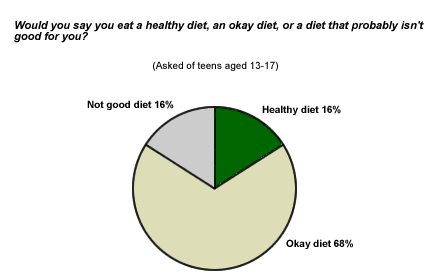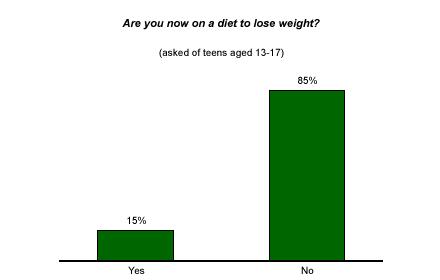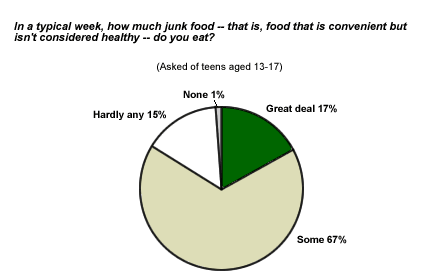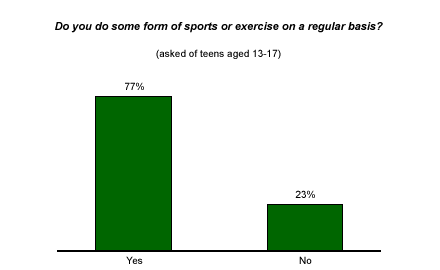The National Center for Health Statistics (NCHS) estimated that in 1999 to 2000, 15% of adolescents (aged 12 to 19) were overweight (see Related Sites). This is the type of finding that led U.S. Surgeon General Richard Carmona to declare an "epidemic of obesity" among today's youth. "It's every bit as threatening as the terrorist threat," Carmona was quoted in a recent TIME article.
The first step in addressing any behavioral health problem is to recognize and accept it. So how healthily do today's teens think they eat? A recent ║┌┴¤═° Youth Survey* investigated this question and other teen attitudes toward diet and exercise.
Teen Diets
When asked if they eat "a healthy diet, an okay diet, or a diet that probably isn't good" for them, only 16% of teens (aged 13 to 17) said they eat a healthy diet. Another 16% reported eating a diet that probably isn't good for them. The greatest percentage of teens, 68%, report eating "an okay diet."

Fifteen percent of teens said that they are currently on a diet to lose weight, a figure similar to the number of teens who report that they do not eat a healthy diet. As noted above, 15% is also the proportion of teens estimated by NCHS to be overweight.

What Are Teens Doing to Control Their Behavior?
As Carmona has asserted, the answer to the teen obesity problem is simple -- teens must modify their behavior by eating better and exercising more. One of the main barriers to healthy eating habits among teens is the lure of junk food. The negative impact of junk food -- specifically fast food -- on kids has been prominent in the news lately, as lawyers in New York have filed multiple complaints against McDonald's, claiming that the fast-food giant made their clients fat.
So how effectively are teens controlling their intake of junk food? Less than 1% of teens say they eat no junk food, and 15% say they eat hardly any. Most teens (84%) report eating at least some junk food in a typical week, including 17% who say they eat a great deal of junk food -- roughly consistent with the percentage of teens who report eating a diet that probably isn't good for them.

The second controllable behavior in the fight against teen obesity is exercising. Nearly one in four teens (23%) report that they do not participate in any form of sports or exercise on a regular basis, while the great majority (77%) does exercise on a regular basis.

Bottom Line
In December 2001, the surgeon general reported 300,000 deaths due to overweight and obesity. People who develop healthy eating and exercise habits as teens are most likely to avoid becoming part of these statistics as adults. (See "Age and Exercise: Good Habits Form Early" in Related Items.)
This study suggests that for every teen who is aware that he or she eats a poor diet, there is one who says he or she is on a diet to lose weight. It seems that many teens have taken the first step in recognizing and accepting that they have a problem. However, the fact that teens recognize the problem does not necessarily indicate that they have changed their behavior. Eighty-four percent of teens report eating junk food each week and 23% report that they do not exercise regularly each week. Addressing these negative behaviors should be major focal point of the preventive health and wellness programs of U.S. healthcare organizations.
*